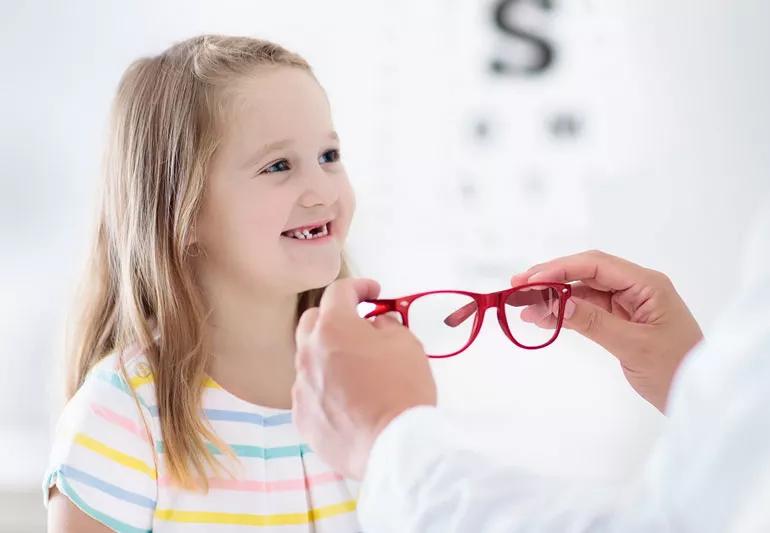Caring for eyes at an early age

Image content: This image is available to view online.
View image online (https://assets.clevelandclinic.org/transform/7fc681a4-4fc0-4fb3-a95a-9629e7cecf8c/childEyeExam-990581804-770x553_jpg)
Child having eye exam at optomentrist office
You want to get your young children off to a good start in every way — and that includes their eye health. But when is the right time to start having your child’s eyes checked? Babies and toddlers can’t read an eye chart, after all. It’s best to start early.
Advertisement
Cleveland Clinic is a non-profit academic medical center. Advertising on our site helps support our mission. We do not endorse non-Cleveland Clinic products or services. Policy
It’s important not to delay eye exams for young infants and children because some early eye problems can affect vision for life. Finding a problem early can keep a minor issue from becoming something major (and harder to treat).
Pediatric ophthalmologist Elias Traboulsi, MD, MEd, emphasizes that eye exams aren’t merely a way to know whether your child needs glasses. Like regular exams with a pediatrician, eye exams are about preventive care.
Dr. Traboulsi recommends a comprehensive eye exam by an eye care professional if possible by age 1, to be repeated before kindergarten in children without any evident eye problems. Pediatricians do perform limited eye examinations right after birth and in the first few years of life. These can detect a variety of abnormalities in the light reflex from the pupil and in the external aspects of the eye and the ocular alignment.
These exams become much more important in children who:
“Even if there are no obvious symptoms, your child may still have a problem with his vision,” he says.
Advertisement
Undiagnosed conditions or abnormalities can lead to vision loss. But it’s possible to reverse some problems if they’re caught early, Dr. Traboulsi says.
A classic example is lazy eye. Kids with this condition have one eye that is weaker than the other.
One of the most common vision problems in children, lazy eye typically responds well to treatment. This may include an eye patch, eye drops or eyeglasses.
Another example is crossed eyes, which involves one or both eyes turning inward or outward. This can require special eyewear or an eye patch.
So how do you know there’s a problem or your child needs to see a doctor?
Here are four key tips that will help you make sure your child has the best eye care from the start.
If you have questions about your young child’s vision, don’t hesitate to schedule an eye exam.
Most children have their vision tested before they start elementary school. But Dr. Traboulsi says it’s ideal to have your child’s eyes tested before they start kindergarten or preschool.
“While it’s ideal for all kids to have their eyes tested, it’s even more important if a child’s brothers or sisters have vision problems,” says Dr. Traboulsi.
As with many other health-related conditions, your child is more likely to have vision problems if they run in your family. So it’s best to start monitoring it early on.
As you know, your pediatrician has specialized training for treating children. By the same token, a pediatric ophthalmologist specializes in detecting and treating children’s eye problems.
With kid-friendly tools and testing, they can pinpoint problems — even if your child hasn’t learned how to talk or doesn’t yet know the alphabet.
Dr. Traboulsi says it’s very important for parents to trust their instincts. After all, you know your child best.
In fact, parents are often the first ones to notice signs of trouble. “If a mom says something is wrong with her child’s eyes or vision and I don’t find anything in the initial exam, I always go back and test again,” he says.
Your doctor may not find a problem at first. But if you still have concerns, keep working to pinpoint the problem. Discuss the signs you’re seeing with your child’s doctor or get a second opinion, if necessary, Dr. Traboulsi advises.
Following these tips will help you protect your child’s vision and promote healthy eyesight for life.
Advertisement

Sign up for our Health Essentials emails for expert guidance on nutrition, fitness, sleep, skin care and more.
Learn more about our editorial process.
Advertisement
Plan on an annual vision screening, but a full exam may not be necessary
Your eyes can reveal many clues about underlying health issues
Most recommended precautions center around minimizing bruising or swelling
Even one drink can have an impact on your cognitive function leading to slurred speech, blurred vision and impaired memory
Understand who may (and may not) benefit
Lorem ipsum dolor sit amet. Et odio Quis vel ipsam omnis eum alias deleniti et placeat impedit non voluptas galisum hic autem enim et cupiditate aliquid. Est beatae quidem non facilis autem ut commodi nisi aut tempore rerum et dolores voluptatem cum enim optio id sapiente quasi. Ad laboriosam officiis 33 cupiditate sequi ea voluptatum consectetur qui necessitatibus voluptate et quasi doloremque et facere explicabo quo explicabo officia
Type 2 diabetes isn’t inevitable with these dietary changes
Applying a hot or cold compress can help with pain
Pump up your iron intake with foods like tuna, tofu and turkey